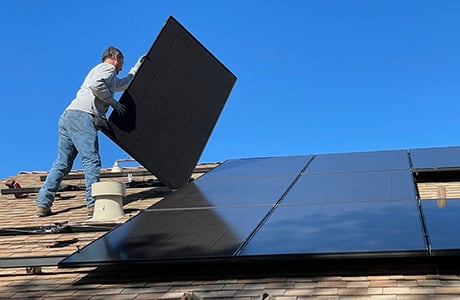The Complete Guide to Solar Power Installment: Conserve Cash and Go Green
Exploring the nuances of solar power setup discloses a complex approach to both cost savings and environmental responsibility. Homeowners are progressively thinking about solar power not only as a feasible option however as a calculated investment that can produce considerable long-lasting benefits. Nevertheless, the procedure includes cautious consideration of various factors, including system selection and installation treatments. Understanding these elements is essential for taking full advantage of effectiveness and savings. What details actions should one take to make certain an effective shift to solar power, and how can economic rewards even more boost this undertaking?
Benefits of Solar Power
The growing fostering of solar energy mirrors a considerable change toward sustainability and ecological responsibility. Among the primary benefits of solar power is its ability to minimize dependence on nonrenewable fuel sources, bring about decreased greenhouse gas exhausts. By harnessing the sun's power, individuals and organizations can add to a cleaner atmosphere and minimize the unfavorable results of climate modification.
Additionally, solar power can cause substantial monetary cost savings. As soon as installed, photovoltaic panels significantly lower electrical energy costs, as they create power from a renewable source. Many governments likewise supply incentives, refunds, and tax obligation credit reports to urge solar fostering, further boosting financial feasibility.
An additional significant advantage is energy independence. Solar energy systems permit homeowners and organizations to generate their own electricity, decreasing susceptability to fluctuating energy prices and supply disruptions. In addition, solar power systems call for marginal upkeep, converting to reduced long-lasting functional expenses.
Picking the Right Planetary System

Solar systems vary considerably in rate depending on their type, size, and efficiency. Think about prospective financing choices such as finances, leases, or power acquisition contracts (PPAs) that might relieve upfront prices.
Readily available space is another critical factor. Assess your roofing's positioning, angle, and shading, as these aspects can affect solar panel efficiency. If roofing system space is limited or improper, ground-mounted systems might be a practical option.
It's vital to carry out comprehensive research study to understand the specific motivations readily available in your area, as they can vary extensively. Consulting with a solar installment professional can help you navigate these alternatives properly, ensuring you maximize your financial savings while adding to a more lasting energy future.
Maintaining Your Planetary System
Efficient maintenance is crucial for making certain the durability and optimal efficiency of your solar power system. Normal upkeep can aid stop minor concerns from intensifying right into expensive repairs and make certain maximum power effectiveness.
Beginning with routine the original source examinations of your photovoltaic panels, ideally every 6 months. Look for dust, particles, or any type of indicators of deterioration. best solar energy company in fort lauderdale. Cleansing the panels, especially in locations susceptible to dirt or bird droppings, can significantly boost energy production. Make use of a soft brush and moderate detergent to prevent harming the surface area.
Next, keep an eye on the inverter. This part converts solar power right into useful electricity and must be examined monthly. Many modern-day inverters have monitoring systems that notify you to performance concerns, permitting timely intervention.
Furthermore, check the circuitry and links for any signs of rust or damage, as these can cause lowered performance or system failing. Think about expert upkeep services yearly for a detailed examination.
Final Thought
In final thought, the fostering of solar energy provides considerable advantages, including reduced electricity prices and a favorable ecological effect. Cautious consideration in selecting the appropriate solar system, paired with a clear understanding of the installment procedure, improves the overall experience. Financial motivations and normal upkeep additionally contribute to the long-term advantages of solar power. Eventually, embracing solar technology stands for a crucial step toward sustainability and power self-reliance, fostering a greener future for all.